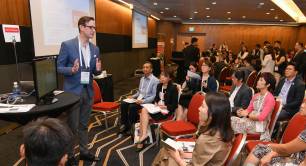Crisis, what crisis? Asia impact investors sound upbeat note ahead of major regional gathering
Despite the huge cloud caused by Covid-19, there are still some silver linings, according to some of the region’s high-profile figures in impact investing and philanthropy.
“Covid, whether we like it or not, will make winners and losers,” said Robin Hu, head of sustainability and stewardship at Temasek International, a Singapore-based investment firm. Among the winners: those working in food supply, production and waste, technology and healthcare.
Business owners in these most profitable fields have “a greater responsibility to put a portion of their profit into doing good”, added Hu, who was speaking on Tuesday at a press briefing hosted by the Asian Venture Philanthropy Network (AVPN), ahead of its annual conference next week.
But the shift to greater corporate responsibility may cut across many more sectors, he suggested.
“Corporate responsibility has never seen as much conviction… I’ve never seen anything like this in the past,” Hu said. “We’re beginning to see a possible shift from profit supremacy to that of a more balanced, triple bottom line approach.”
Food, technology and healthcare businesses will have a greater responsibility to put a portion of their profit into doing good
Tony Yeung, CEO of the Hong Kong-based Peterson Holdings Company (as well as a director of AVPN), said he was looking at how its portfolio companies could both play a part during Covid “and how they can improve on ESG [environmental, social and governance] standards” in the longer term: “We’re taking this opportunity as a wake-up call”.
Yeung was also bullish on the effects of the pandemic on impact investing itself – pointing to reports of impact funds outperforming others recently and to a “growing interest” in this direction.
“I do think during this crisis that people have recognised that impact investing is viable, is possible, and people are trying to allocate more to this space.”
People have recognised that impact investing is viable, and are trying to allocate more to this space
Hu admitted that the impact investment industry was facing not insignificant barriers – including the challenge of finding sufficient investable prospects – but insisted it was “a knock, and not a knock-out”.
“There is no reason to say, why are we doing impact investing. You don’t ask yourself why am I investing for humanity.”
High-risk capital – delivered more quickly
Turning non-investable prospects into investable ones is part of the role of philanthropic capital, which can often step in where neither commercial funds nor government money can.
“We use our resources as high-risk capital: we can fail fast and learn fast and move on,” said Deepali Khanna, managing director of the Rockefeller Foundation’s Asia office. “We’re able and allowed to take those risks. And I think in this moment agility is really critical.”
Khanna admitted her own organisation – which has committed $50m to the global coronavirus response – had recently seen room for improvements.
“Our own grantmaking processes have been quite onerous,” she said. “Our systems have been very bureaucratic over the years.” The foundation is learning how to get money out more quickly to its partners and how to combine efforts on things like due diligence: “We’re learning a lot.”
Our own grantmaking processes have been quite onerous
The current resource pressures are also making clear the “power of collaboration”, Khanna said.
Working closely with India’s government, for instance, Rockefeller is supporting the development of domestic manufacturing of Covid-19 testing kits, and exploring how to apply global expertise on behavioural economics to design policies that would help nudge people towards social distancing.
Asked if philanthropists were taking on more of the burden left by the public and private sectors, Khanna said all governments in the region were “really trying to do their very best” to look after their citizens.
“We are being called upon to help fill in the gaps in a lot of places, and we’re more than happy to do that because the issues that we’re facing are so humongous.”
The AVPN Virtual Conference takes place 8-12 June; register here. Header image: aerial view of Singapore.
We're working hard to provide the most up-to-date news and resources to help social businesses and impact investors share their experiences and get through the Covid-19 crisis. But we need your support to continue. As a social enterprise ourselves, Pioneers Post relies on paid subscriptions and partnerships to sustain our purpose-led journalism – so if you think it's worth having an independent, mission-driven, specialist media platform for the impact movement, please click here to subscribe.




